#Keyword Research Tools
Explore tagged Tumblr posts
Text
Top Features of Uber suggest That Every Digital Marketer Should Know
In the sector of virtual advertising and marketing, in which visibility and engagement are key, having the proper tools at your disposal could make a widespread difference. Among the plethora of search engine marketing tools available, Uber suggest has emerged as a powerful and flexible answer that caters to companies, marketers, and individuals aiming to decorate their on-line presence. Created through fam end marketer Neil Patel, Uber suggest offers a variety of capabilities designed to optimize websites, generate focused site visitors, and enhance search engine ratings. This article delves into the features, advantages, and practical programs of Uber suggest, showcasing how it may be leveraged to reap SEO success.
How to optimize content with Uber Suggest
What is Uber suggest?
Uber suggest is an all-in-one SEO and key-word research device that offers insights to help users improve their internet site's performance on engines like google. Originally launched as a simple keyword thought device, it has advanced into a complete platform offering features like key-word research, content material thoughts, one way link analysis, website audits, and aggressive evaluation. Whether you're a newbie or a pro professional, Uber suggest is designed to simplify complex search engine marketing procedures and deliver actionable insights.
Key Features of Uber suggest
1. Keyword Research
Keyword research is on the core of any search engine marketing method, and Uber suggest excels on this area. It permits customers to find out new keywords, analyze their search volume, and check their competition degree. By coming into a seed key-word, users can generate a listing of associated key phrases along side metrics consisting of:
Search Volume: The common variety of monthly searches for a key-word.
Search engine optimization Difficulty (SD): A rating indicating how challenging it is to rank for the key-word organically.
Paid Difficulty (PD): A score displaying how aggressive the keyword is for paid search campaigns.
Cost Per Click (CPC): The common value of running a paid ad for the key-word. These metrics enable customers to discover excessive-appearing keywords that align with their content material dreams and audience desires.
2. Competitor Analysis
Understanding your competition is critical for gaining a aggressive edge. Uber suggest provides distinctive competitor analysis via revealing:
Top-performing pages of competition
Keywords using visitors to their websites
Backlink profiles, including the number and nice of one way links
Estimated month-to-month traffic
By reading these metrics, users can find possibilities to outperform competitors by growing better content material and constructing more potent back-link profiles.
Three. Content Ideas
Creating excellent, engaging content is crucial for attracting and maintaining traffic. Uber suggest content thoughts function helps users generate topics based on famous keywords. It presentations:
Trending articles related to the keyword
Estimated visitors for every article
Social media stocks and engagement
These insights manual customers in crafting content material that resonates with their audience and ranks well on search engines like google and yahoo.
4. Backlink Analysis
Backlinks are a crucial ranking thing for search engines, and Ubersuggest gives a robust oneway link analysis device. Users can:
Analyze their very own oneway link profile
Identify referring domains
Discover inbound links pointing to competition’ web sites
Evaluate the satisfactory and authority of inbound links
This function is useful for developing a hyperlink-constructing method that complements domain authority and boosts scores.
5. Site Audit
Ubersuggest’s web page audit feature gives a comprehensive evaluation of a internet site’s health. It identifies technical troubles, along with:
Broken hyperlinks
Slow page load instances
Missing meta tags
Mobile usability issues
The device generates a health score and gives pointers to restore troubles, making sure optimum performance and person experience.
6. Rank Tracking
Monitoring your key-word scores is vital for assessing the effectiveness of your search engine optimization efforts. Ubersuggest’s rank tracking characteristic lets in users to:
Track keyword positions through the years
Analyze fluctuations in ratings
Compare overall performance towards competitors
This facts helps customers refine their strategies and maintain a aggressive area.
Benefits of Using Ubersuggest
1. User-Friendly Interface
One of the standout functions of Ubersuggest is its intuitive and person-friendly interface. Unlike some search engine optimization gear that may be overwhelming for novices, Ubersuggest simplifies complicated facts and gives it in an smooth-to-understand layout.
2. Cost-Effective Solution
While many search engine marketing equipment include hefty fee tags, Ubersuggest offers a variety of less costly plans, which include a unfastened version with primary features. This makes it available to small corporations and people with constrained budgets.
Three. Comprehensive Insights
Ubersuggest affords a wealth of data, from keyword evaluation to web page audits, permitting users to make knowledgeable choices and enforce powerful techniques. Its comprehensive approach ensures that no element of search engine marketing is omitted.
Four. Regular Updates
As search engine marketing algorithms evolve, staying up to date is critical. Ubersuggest is regularly updated to reflect modifications in seek engine algorithms, ensuring that users have get admission to to correct and relevant data.
Five. Actionable Recommendations
Ubersuggest doesn’t simply offer facts—it gives actionable pointers that guide users in optimizing their websites and improving their ratings.
Practical Applications of Uber suggest
1. Content Creation
By figuring out high-acting key phrases and analyzing competition’ content material, customers can create weblog posts, articles, and different sorts of content material that attract natural site visitors. For example, a health blogger can use Ubersuggest to find out trending topics like "10-minute domestic workout routines" or "wholesome meal prep ideas."
2. Improving On-Page search engine marketing
Ubersuggest’s website audit function helps users identify and connect on-web page search engine marketing issues, such as missing alt tags or duplicate content. Addressing those issues improves website performance and search engine rankings.
3. Enhancing Link-Building Efforts
With the one-way link analysis device, users can discover first-rate websites for outreach and construct relationships that result in valuable oneway links. This strengthens their area authority and boosts visibility.
Four. Monitoring Competitors
By analyzing competitors’ strategies, users can pick out gaps of their very own method and capitalize on opportunities. For instance, if a competitor’s pinnacle-appearing web page lacks comprehensive statistics, customers can create extra specific content material to outrank them.
5. Tracking Progress
Regularly tracking key-word ratings and website overall performance guarantees that customers stay heading in the right direction with their dreams. If rankings drop, customers can quickly pick out the cause and modify their strategies.
Tips for Maximizing Ubersuggest’s Potential
Start with the Free Version: Explore the simple capabilities to recognize how the device works earlier than upgrading to a paid plan.
Focus on Low-Competition Keywords: Targeting key phrases with low opposition and high seek quantity can yield quicker results.
Leverage Content Ideas: Use the content material ideas characteristic to brainstorm attractive topics that align along with your area of interest.
Schedule Regular Audits: Conduct site audits periodically to become aware of and address technical problems.
Monitor Progress: Use the rank tracking characteristic to evaluate the impact of your search engine optimization efforts and make facts-pushed adjustments.
2 notes
·
View notes
Text
The Relevance of Conducting Keyword Research in Digital Marketing
In a world dominated by technology where businesses require visibility to succeed. The only way to cut through the noise of millions of websites is to know what your audience wants, and then create content that addresses that need. This is where conducting keyword research comes in- it is a critical building block that goes into constructing a good digital marketing strategy.
Understanding Keyword Research :
In most cases, users do not type in full sentences into search engines- instead, they search for keywords and phrases. Keywords are what connect the questions asked by the user, to a piece of content prepared to answer the query. Identifying keywords allows businesses to create content that users are looking for, increasing their chances of ranking higher in search results, and making more sales.
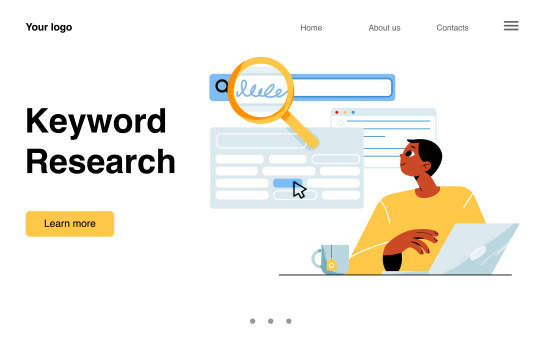
Why Is Keyword Research Important?
A Better Return On Investment (ROI): Returning from targeted ads is higher than any other form or investing in advertising channels, for example: Pay per click adverts.
Increased Visibility: It is extremely hard to get noticed as a new website, and investing in keywords will allow you to boost your website’s organic traffic.
Understanding Audience Intent: Good keyword research helps you understand what your target audience is looking for and how they phrase their queries. You can, therefore, create content that directly answers their needs, thus building trust and fostering engagement.
3. Competitive Advantage: Analyze the keywords your competitors are targeting, find gaps in their strategy, and identify opportunities to differentiate your content. This way, you are ahead in a crowded marketplace.
4. Cost-Efficient Advertising: Keyword research for paid campaigns is very important. For example, Google Ads has to be able to select appropriate cost-effective, high-performing keywords. So, targeting the right keywords really minimizes waste and maximizes ROI.
5. Content Strategy Development: It acts as a roadmap for content strategy. By creating blog posts, videos, and other such assets that actually resonate with the audience while satisfying the search engines, it provides a well-researched list of keywords.
Effective Keyword Research Tips
Use Tools: Utilize Google Keyword Planner, SEMrush, or Ahrefs to uncover the volume, competition, and trend of your keyword.
Long Tail Keywords: Be more specific as they tend to have less competition and more chances of conversion
Search Intent: Identify if it is an information intent, a navigational intent, or transactional intent to use it appropriately for your content.
Keep fresh: trends in searches change, and your keyword approach should be reviewed regularly.
Keyword research is far from a technical task; it's a strategic initiative that bestows business the power to connect with audiences more effectively. The time and resources you invest in understanding the language of your customers set you up for long-term digital marketing success. Whether you are optimizing for organic search or planning a PPC campaign, keyword research is the compass guiding your efforts toward measurable results.
#Digital Marketing#SEO Strategy#Search Engine Optimization#Audience Intent#Content Marketing#PPC Campaigns#Long-Tail Keywords#Marketing Tips#Competitive Analysis#Online Advertising#Marketing Strategy#Website Traffic#Organic Search#Digital Marketing Trends#Keyword research#keyword research tools
2 notes
·
View notes
Text

#digital marketing#marketing#seo#stategies#web design#keywords#ranking#seo ranking#keyword ranking#keyword research#keyword research tools
3 notes
·
View notes
Text


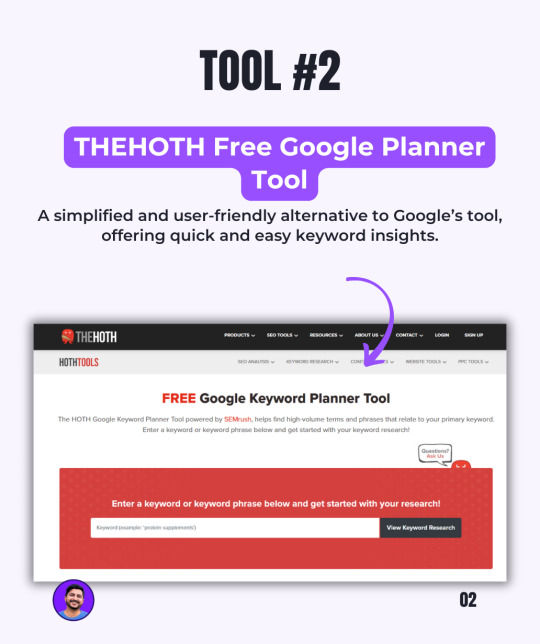

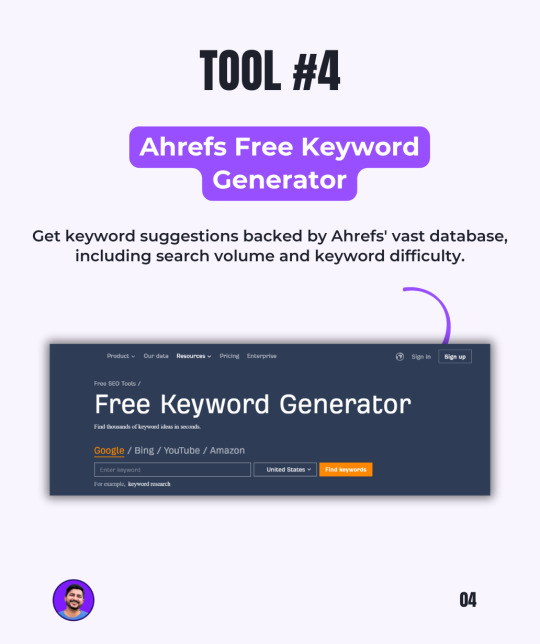

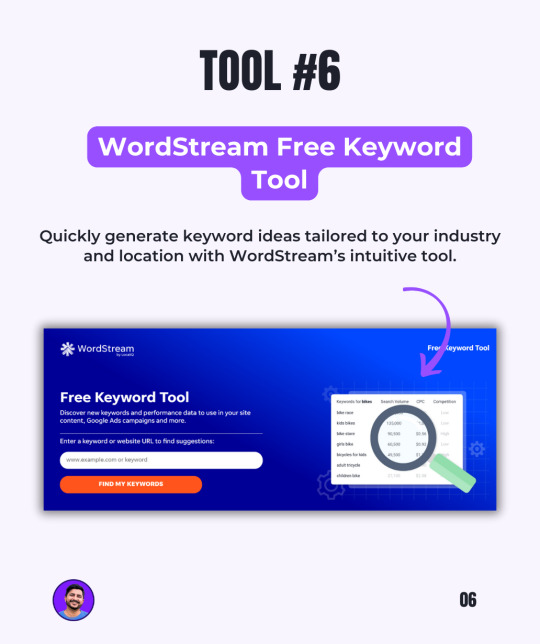
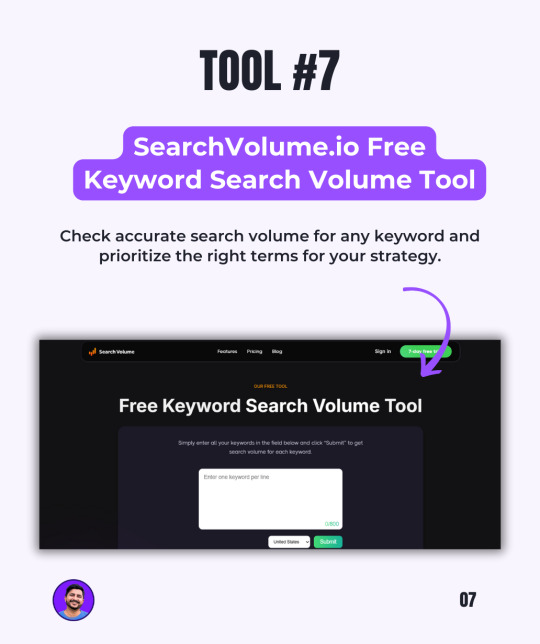

🚀 𝗦𝘁𝗼𝗽 𝗚𝘂𝗲𝘀𝘀𝗶𝗻𝗴, 𝗦𝘁𝗮𝗿𝘁 𝗥𝗮𝗻𝗸𝗶𝗻𝗴: 𝟳 𝗙𝗿𝗲𝗲 𝗞𝗲𝘆𝘄𝗼𝗿𝗱 𝗥𝗲𝘀𝗲𝗮𝗿𝗰𝗵 𝗧𝗼𝗼𝗹𝘀 𝗬𝗼𝘂 𝗡𝗲𝗲𝗱! 🚀
When I started working with professional coaches,
I realized one common mistake they make:
𝗧𝗵𝗲𝘆 𝗯𝘂𝗶𝗹𝗱 𝗮 𝘄𝗲𝗯𝘀𝗶𝘁𝗲 𝗮𝗻𝗱 𝘄𝗮𝗶𝘁 𝗳𝗼𝗿 𝗰𝗹𝗶𝗲𝗻𝘁𝘀 𝘁𝗼 𝗰𝗼𝗺𝗲.
But without the right keywords, your website stays invisible on Google
— and your ideal clients never find you.
A beautiful website without SEO is like a shop with no signboard.
𝗜𝗳 𝘆𝗼𝘂𝗿 𝘀𝗶𝘁𝗲 𝗱𝗼𝗲𝘀𝗻’𝘁 𝗿𝗮𝗻𝗸 𝗼𝗻 𝗚𝗼𝗼𝗴𝗹𝗲, 𝘆𝗼𝘂’𝗿𝗲 𝗹𝗲𝗮𝘃𝗶𝗻𝗴 𝗺𝗼𝗻𝗲𝘆 𝗼𝗻 𝘁𝗵𝗲 𝘁𝗮𝗯𝗹𝗲.
So, I’ve created this PDF: 𝟟 𝗙𝗿𝗲𝗲 𝗞𝗲𝘆𝘄𝗼𝗿𝗱 𝗥𝗲𝘀𝗲𝗮𝗿𝗰𝗵 𝗧𝗼𝗼𝗹𝘀
— tools I personally use to help my clients find the
right keywords and attract their ideal audience.
𝗪𝗵𝗮𝘁 𝘆𝗼𝘂’𝗹𝗹 𝗹𝗲𝗮𝗿𝗻:🔍
How to find the exact keywords your audience is searching for💡
Tools that show you search volume, competition, and
trends⚡ How to use these tools to boost your Google ranking
𝗗𝗼𝗻’𝘁 𝗹𝗲𝘁 𝘆𝗼𝘂𝗿 𝘄𝗲𝗯𝘀𝗶𝘁𝗲 𝗯𝗲 𝗮 𝗺𝗶𝘀𝘀𝗲𝗱 𝗼𝗽𝗽𝗼𝗿𝘁𝘂𝗻𝗶𝘁𝘆. Download this PDF and start using these tools today.
💬 𝗗𝗠 𝗺𝗲 𝗳𝗼𝗿 𝗮 𝗙𝗥𝗘𝗘 𝘄𝗲𝗯𝘀𝗶𝘁𝗲 𝗮𝘂𝗱𝗶𝘁 𝗼𝗿 𝗰𝗼𝗻𝘀𝘂𝗹𝘁𝗮𝘁𝗶𝗼𝗻. Let’s fix your SEO and grow your coaching business!
Visit now: https://digitaldeeptech.com/keyword-research-services/
#Free Keywords Research Tools#keyword research tools#keyword research hacks#DSWebRank#DigitalDeepTech#How to find keywords
1 note
·
View note
Text
Low Competition Keywords for SEO Content Strategy?
Recently started to explore this NEW research tool to [tap low competition keywords] and it seems to be promising:
>> Find Your Low Keywords with QuestionDB [affiliate link]
Ready to blow up your content strategy?

#keyword research#low competition keywords#seo content strategy#seo tools#keyword research tools#content creation
0 notes
Text
Keyword Research: The Ultimate Guide to SEO Success
Discover essential tools for keyword research and analysis.Master keyword research strategies, and optimize your content for top search engine ranking
For more information- https://digitalthrivehub.blogspot.com/2024/07/keyword-research-the-ultimate-guide-to-seo-success%20.html
0 notes
Text
Boost Your Blog: Simple SEO & SEM with AI for New Bloggers
Part 3: A Beginner’s Guide to Navigating the Digital Marketing Landscape with AI Feeling lost in the SEO and SEM jungle? You’re not alone. Ranking on Google can seem like a mystery, but don’t worry, help is here! In this post, we’ll unveil a secret weapon: Artificial Intelligence (AI). Tired of spending hours on keyword research? AI tools can find the perfect keywords people are actively…

View On WordPress
#AI marketing tools#AI SEO#blogger tips#content creation tools#content marketing#digital marketing strategy#keyword research tools#SEM for beginners#SEO for beginners#SEO hacks
0 notes
Text
Introduction To SEO Keyword Selection - #AffordableSEO, #ContentMarketing, #DigitalMarketing, #Google, #KeywordResearch, #Keywords, #LocalSEO, #LocalSEOTampa, #SearchEngine, #SEO, #SEOAgency, #SEOCompany, #SEOTips, #SmallBusiness, #Tampa, #WebMarketing - https://localseotampa.com/introduction-to-seo-keyword-selection-202402/
New Post has been published on https://localseotampa.com/introduction-to-seo-keyword-selection-202402/
Introduction To SEO Keyword Selection
Choosing the right SEO keywords is crucial for the success of your business marketing. Keywords are the foundation of SEO and play a significant role in determining the visibility of your website on search engines. Here’s a comprehensive guide on selecting the best SEO keywords for your business.
Understanding Keyword Relevance
1. Identify Your Business Niche: Understand the specific niche your business operates in. This will help you target the right audience.
2. Know Your Audience: Analyze your target audience’s search habits. What terms do they use when looking for products or services you offer?
3. Analyze Your Products/Services: List down the key features and benefits of your offerings. This can give you a basic set of keywords.
Research and Brainstorming
1. Brainstorm Initial Keywords:
Begin by identifying the core aspects of your business, products, or services.
Consider the language your customers might use when searching for your offerings.
Include both broad and specific terms, as well as synonyms and industry jargon.
Think about the intent behind the searches—what problems or needs might lead someone to your business?
2. Utilize Keyword Research Tools:
Employ tools like Google Keyword Planner, SEMrush, or Ahrefs for a more comprehensive list.
These tools offer insights into keyword search volume, which indicates how often keywords are searched.
They also provide data on keyword competition, helping you understand how difficult it might be to rank for specific terms.
Look for related keywords or phrases that you might not have considered initially.
Analyze trends to see if certain keywords are gaining or losing popularity.
3. Study Your Competitors:
Examine the websites of your main competitors. Pay attention to the keywords they use in their titles, headers, and content.
Investigate the backlink profiles of your competitors to see which keywords are driving traffic to their sites.
Look for gaps in their keyword strategies that you could exploit.
Evaluating Keyword Metrics
1. Search Volume: Look for keywords with a decent search volume. These are terms that your target audience frequently searches for.
2. Keyword Difficulty: Be mindful of the competition. High-competition keywords might be challenging to rank for, especially for new or small businesses.
3. Relevance and Intent: Ensure the keywords are not just popular but also relevant to your business. Understand the intent behind the searches – are they informational, navigational, transactional, or commercial?
Strategic Keyword Implementation
1. Balance Long-Tail and Short-Tail Keywords: Long-tail keywords (more specific, longer phrases) are often less competitive and more targeted, while short-tail keywords (one or two words) have higher search volumes but are more competitive.
2. Localize Your Keywords: If your business serves a specific geographical area, include local keywords. For example, “boutique in downtown Chicago.”
3. Update Regularly: SEO is dynamic. Regularly review and update your keywords to align with changing search trends and business focus.
Monitoring and Refining
1. Track Performance: Use SEO tools to monitor how your keywords are performing. Look at metrics like search rankings, website traffic, and conversion rates.
2. Refine Strategy: Based on performance data, refine your keyword strategy. Discard underperforming keywords and experiment with new ones.
3. Stay Updated: Keep up with the latest trends in SEO and keyword research. Search engines frequently update their algorithms, which can affect keyword effectiveness.
Ethical Considerations
1. Avoid Keyword Stuffing: Overusing keywords on your website can lead to penalties from search engines. Ensure your content is natural and user-friendly.
2. Focus on Quality Content: While keywords are important, the quality of your content is paramount. Provide value to your users with informative, engaging, and relevant content.
In summary, selecting the right SEO keywords involves understanding your business and audience, thorough research, strategic implementation, continuous monitoring, and a commitment to providing quality content. Enhancing your website’s visibility, attracting the right audience, and driving business success are complex tasks, and sometimes expert assistance can be invaluable. For businesses in Clearwater, Florida, Local SEO Tampa Company offers specialized services to optimize your local SEO strategy, ensuring that your business stands out in a competitive market. By partnering with professionals like Local SEO Tampa Company, you can guarantee that your SEO efforts are not only effective but also tailored to your unique business needs.
Picture Credit: Freepik
#Content#Content for SEO#content marketing#Content Marketing Strategy#Google#Keyword research#Keyword Research Tools#Keyword Selection#keywords#Local SEO#Online Marketing#SEO#SEO Company#SEO content#SEO Strategy#SEO Tips
0 notes
Text
What is the best free tool for keywords to long tail keywords converts?
Converting regular keywords into long-tail keywords often involves understanding user intent and finding specific, niche variations. While there isn't a single tool dedicated solely to this transformation, various keyword research tools can help you identify long-tail keyword variations. Here are some tools that can assist you in finding long-tail keywords:
Google Keyword Planner:Google's Keyword Planner is a powerful tool for discovering new keywords and assessing their search volume. While it doesn't explicitly generate long-tail variations, it provides insights into related keywords that may include long-tail options.
Ubersuggest:Ubersuggest, developed by Neil Patel, provides keyword suggestions and variations. It offers insights into search volume, CPC, and competition, making it helpful for finding potential long-tail keywords.
AnswerThePublic:AnswerThePublic is a unique tool that visualizes questions and phrases related to a specific keyword. This can help you identify long-tail variations based on the questions users might ask.
Google Trends:Google Trends can reveal the popularity of search queries over time. While not a traditional keyword tool, it can give you an idea of emerging trends and potential long-tail variations.
Soovle:Soovle aggregates keyword suggestions from various search engines, including Google, Bing, Yahoo, and others. It's a quick way to see different variations and get inspiration for long-tail keywords.
Keyword Surfer:Keyword Surfer is a Chrome extension that displays search volume data directly in Google search results. It can help you identify long-tail opportunities as you perform regular searches.
LSIGraph:LSIGraph focuses on providing Latent Semantic Indexing (LSI) keywords, which are conceptually related to your primary keywords. Exploring LSI keywords can help you discover long-tail variations.
WordStream Free Keyword Tool:WordStream offers a free keyword tool that provides keyword suggestions along with search volume and competition data. It's user-friendly and can assist in finding potential long-tail keywords.
Remember that the process of finding effective long-tail keywords involves a mix of tools, creativity, and a deep understanding of your target audience's needs. Additionally, incorporating customer feedback, industry knowledge, and monitoring trends can contribute to identifying valuable long-tail variations for your content and SEO strategy.DO Studio : Best Marketing Agency In CalicutDo Studio is the Best Marketing agency in Calicut. We do Digital Marketing, Branding, Web Design, Web Developement, Package Design & Print Designhttps://dostudio.co.in/
0 notes
Text
How Keyword Research Tools Drive Organic Traffic?
In the world of the internet, strategic keyword research is the key to increase your visibility and reach the right audience. As we dive deeper into the digital world, it’s becoming increasingly clear that using keyword research tools effectively is the best way to drive organic traffic to your site.

How It Helps?
The Digital Significance of Keyword Research : In the ever-growing world of search engines, keyword research tools are the key to understand the language your audience uses when searching for information online.
Understand User Intent : Keyword research isn’t just about finding keywords; it’s about understanding what users are looking for. It helps you find out what questions and needs people are searching for, so you can tailor your content accordingly.
Create SEO-friendly Content : With the help of keyword research tools, it is possible to create content that is based on the keywords and phrases that your audience is actively searching for. This allows you to optimize your content directly for search engines, increasing your organic visibility.
Stay Ahead of the Trends : But keyword research tools don’t stay the same. They’re constantly adapting to digital trends. When you stay up-to-date on the most recent keywords and search trends, you make sure your content is at the top of what your target audience is interested in.
Long-Tail Discovery : These tools reveal more about long-tail keywords than just generic terms. Long-tail keywords are specific phrases that may have a lower search volume but often represent high user intent. These long-tail keywords are a great way to drive organic traffic to specific content.
Analytics to Fine-tune Strategies : These tools don’t just help you discover new keywords; they also provide analytics to help you measure how your chosen keywords are performing. With this data-driven approach, you can fine-tune your strategies for continuous improvement and long-term success.

In short, with the right keyword research tools, you can speak the language of your audience and tailor your online presence to meet their needs. As you navigate through this ever-evolving landscape, remember that organic traffic isn’t just about how many visitors you get. It’s about how good those visitors are. And that’s exactly what strategic keyword optimization is all about.
0 notes
Text

How can I generate large lists of keywords and keyword groups from my customer personas?
Understanding your audience is paramount in the dynamic digital marketing landscape. One effective way to bridge the gap between your brand and potential customers is to use buyer personas to create a well-structured list of keywords and keyword groups. In this step-by-step guide we will demonstrate your way through the process, and unlock the potential of customers with personas for complex keyword strategies.
Step 1: Create a comprehensive buyer persona Start with detailed buyer personas that represent your target audience. Define demographics, interests, pain points, and trends to provide a solid foundation for your keyword research.
Step 2: Consider the main points and themes Analyze each customer persona and identify key issues and issues relevant to your business. These can range from specific needs and challenges to wants and desires.
Step 3: Extract the result keywords Remove the seed keyword from the title from any specified title. These are keywords that encompass the essence of each persona and can be the starting point for keyword expansion.
Step 4: Use keyword research tools like Google Keyword Planner, SEMrush, or Ahrefs to expand your results for keywords to a larger list. Look for relevant terms, long-tail keywords, and variations that match your customers’ personalities.
Step 5: Group the keywords together in a title Organise the generated keywords into subject groups. This step maximises your keyword list structure and simplifies targeted content creation and campaign planning.
Step 6: Prioritise and refine Prioritise generated keywords based on relevance, search volume, and competitiveness. Optimise content by eliminating unnecessary content or excessive competition, and ensure that your focus remains on high-impact keywords.
Step 7: Add long-tail keywords Underestimate the power of long-tail keywords. Add these specific, niche phrases to your lists to capture more targeted traffic and cater to specific customers.
Step 8: Validate User Information Consolidate your keyword lists by getting audience feedback. Use surveys, social media research, or direct communication to understand how your customers search for and find your business-related products or services.
Step 9: Monitor and Adapt Always check the performance of your chosen keyword. Be flexible and be prepared to change your keyword strategy based on evolving consumer behaviours, industry changes, and the effectiveness of your campaigns.
Conclusion:
By matching your keyword strategy with insights from buyer personas, you not only generate a large list of relevant keywords but you also connect with audiences on a deeper level This advanced approach not only increases your search engine visibility but also improves the overall effectiveness of your digital marketing efforts . Embrace the power of buyer personas and move your brand forward in the vast digital landscape. If we want to find businesses that are in need of digital marketing services, we also write guides on the other needs (web hosting, small business financing, etc.) of these businesses and their owners and top executives. This helps create a broad funnel that brings in your target customers to your website.
#Guide to Keyword Generation#Keyword Research Tools#Semrush#Ideasscope#pain point keyword research#digitalmarketing#ppcmanagement#seo expert#seo services#social media marketing agencies#keywords#ideasscope
0 notes
Text
Do informative niches have low KD and high competition?
Informative niches are topics that provide useful information to the audience, such as how-to guides, tutorials, reviews, facts, etc. They are often popular among online users who are looking for answers to their questions or solutions to their problems.
However, informative niches do not necessarily have low KD and high competition. KD stands for keyword difficulty, which is a metric that measures how hard it is to rank for a certain keyword in the search engines. Competition refers to the number and quality of other websites that are targeting the same keyword or niche.
The KD and competition of an informative niche depend on several factors, such as:
The demand and supply of the information. If the information is highly sought-after and scarce, then the niche will have high KD and competition, as many websites will try to fill the gap and attract the audience. On the other hand, if the information is low in demand and abundant, then the niche will have low KD and competition, as there will be less interest and more saturation in the market.
The level of expertise and authority required to provide the information. If the information is complex, technical, or specialized, then the niche will have high KD and competition, as only a few websites will have the knowledge and credibility to deliver the information. On the other hand, if the information is simple, general, or common, then the niche will have low KD and competition, as many websites will be able to offer the information.
The monetization potential and profitability of the information. If the information is valuable and can generate revenue for the website, then the niche will have high KD and competition, as many websites will try to capitalize on the opportunity and earn money. On the other hand, if the information is free and cannot generate income for the website, then the niche will have low KD and competition, as there will be less incentive and more altruism in the market.
Therefore, informative niches can have different levels of KD and competition depending on these factors. Some examples of informative niches with low KD and high competition are:
Survival: This niche provides information on how to prepare for and cope with various emergency situations, such as natural disasters, pandemics, wars, etc. It has low KD because the information is relatively easy to obtain and share, but it has high competition because the information is highly relevant and profitable, especially in times of crisis12
Keto diet: This niche provides information on how to follow a low-carb, high-fat diet that can help with weight loss, diabetes, epilepsy, and other health conditions. It has low KD because the information is widely available and simple to explain, but it has high competition because the information is very popular and lucrative, especially among health-conscious consumers2
Baby care and clothing: This niche provides information on how to take care of and dress up newborns and toddlers. It has low KD because the information is common and easy to access, but it has high competition because the information is very important and profitable, especially among parents and caregivers12
Some examples of informative niches with high KD and low competition are:
Hypnotherapy: This niche provides information on how to use hypnosis to treat various psychological and physical issues, such as anxiety, phobias, pain, addiction, etc. It has high KD because the information is complex and specialized, but it has low competition because the information is niche and less profitable, especially among mainstream audiences12
Nootropics: This niche provides information on how to use cognitive enhancers to improve memory, focus, creativity, mood, etc. It has high KD because the information is technical and scientific, but it has low competition because the information is niche and less profitable, especially among general audiences12
Fine jewelry: This niche provides information on how to buy, sell, and appreciate high-end jewelry, such as diamonds, pearls, gold, etc. It has high KD because the information is rare and exclusive, but it has low competition because the information is niche and less profitable, especially among average consumers2
If you have any further questions, please feel free to ask. If you found this answer useful, please Follow, comment, and like it.
#informative post#bloggers on tumblr#niche interests#keyword research tools#keyword optimization#blogging community#blog post
0 notes
Text
#blog engagement#keyword research tools#tips and tricks#digital marketing blog#tools#keywords#digitalmarketing
0 notes
Text
Keyword Research tools for SEO in 2023
The digital landscape is ever-evolving, and so are the tools and techniques used in the realm of Search Engine Optimization (SEO). One of the foundational aspects of Keyword Research tools for SEO in 2023. It’s the process of identifying the terms and phrases that potential customers use to search for products, services, or information online. As we step into 2023, let’s delve into the latest…

View On WordPress
#Blog Niche#Blog Readers#Blogger#Blogging#Ethical SEO#Keyword Research tools#Profitable Blog Niche#SEMrush#SEO#Voice Search Optimization#Wordpress
0 notes
Text
What are the top 10 free tools for keyword research?

Keyword research is a crucial part of any effective SEO strategy. Here are 10 free tools that can help you with keyword research:
Google Keyword Planner: A powerful tool directly from Google that provides keyword ideas, search volume data, and suggested bids for paid advertising.
Ubersuggest: This tool offers keyword suggestions, search volume, CPC data, and competitive analysis. It also provides insights into content ideas and backlink opportunities.
Keyword Surfer: A browser extension that shows search volume and related keywords directly in Google search results, helping you quickly identify keyword opportunities.
AnswerThePublic: This tool generates visualizations of questions, prepositions, and comparisons related to your keyword, helping you understand user intent and generate content ideas.
KeywordTool.io: Offers keyword suggestions from various sources, including Google, YouTube, Bing, Amazon, and more, providing insights into different platforms.
Google Trends: Helps you see the popularity of a keyword over time and its regional interest. It's useful for understanding keyword trends and seasonality.
Wordtracker Scout: A browser extension that helps you find keyword opportunities on any webpage you visit, including competitor websites.
Soovle: This tool gathers keyword suggestions from multiple search engines and platforms, providing a comprehensive view of user queries.
Seed Keywords: Allows you to create scenarios and invite people to provide search queries, helping you understand how users search for information.
Serpstat: While it has paid features, Serpstat offers limited free access to its keyword research tool, helping you find keyword suggestions, search volume, and competition data.
Remember that while these tools offer valuable insights, using multiple tools in combination can provide a more comprehensive understanding of keyword opportunities. Additionally, keep in mind that keyword research is just the beginning; crafting high-quality content that meets user intent is equally important for SEO success.
0 notes
Text
Which is the best keyword research tool for a beginner in SEO? What are its pros and cons?
There are several keyword research tools available, and the best one for a beginner in SEO often depends on factors such as user-friendliness, features, and pricing. One widely recommended tool for beginners is Google Keyword Planner.
Google Keyword Planner:
Pros:
Free to Use: Google Keyword Planner is free to use, making it accessible to beginners with limited budgets.
Integration with Google Ads: It seamlessly integrates with Google Ads, allowing users to see search volume data directly from Google.
Keyword Suggestions: Provides keyword suggestions based on the entered terms, helping users discover relevant keywords.
Historical Data: Offers historical data on search volume, giving insights into keyword trends over time.
Competition Insights: Provides an estimate of the competition level for each keyword, helping users understand the potential competitiveness of a keyword.
Location and Language Targeting: Allows users to filter results based on specific locations and languages, which is useful for localized SEO efforts.
Grouped Keyword Ideas: Groups keyword ideas into themes, making it easier to organize and plan campaigns.
Cons:
Focused on Paid Advertising: While it's useful for SEO keyword research, Google Keyword Planner is primarily designed for Google Ads, so some features may be more oriented toward paid advertising.
Limited Competitor Analysis: It provides limited information about competitors and may not offer as in-depth competitor analysis as some other dedicated SEO tools.
Basic Keyword Metrics: It may lack some of the advanced keyword metrics and insights provided by dedicated SEO tools.
Other Options:
If you're looking for alternatives, some other popular keyword research tools include:
Ubersuggest: Offers keyword suggestions, search volume, and competition data. It's user-friendly and has both free and paid versions.
Ahrefs Keywords Explorer: A comprehensive tool that provides in-depth keyword data, including search volume, keyword difficulty, and competitor analysis. However, it comes with a paid subscription.
Semrush: A versatile tool that offers not only keyword research but also site audit, backlink analysis, and more. It's powerful but may be more suitable for users who are willing to invest in a comprehensive SEO tool.
Ultimately, the best tool for a beginner depends on individual preferences, requirements, and budget constraints. Starting with Google Keyword Planner is a solid choice for those new to SEO, and as your skills and needs evolve, you may explore other tools that offer more advanced features and insights.
DO Studio : Best Marketing Agency In CalicutDo Studio is the Best Marketing agency in Calicut. We do Digital Marketing, Branding, Web Design, Web Developement, Package Design & Print Designhttps://dostudio.co.in/
0 notes